e16 // An extravagant equinox
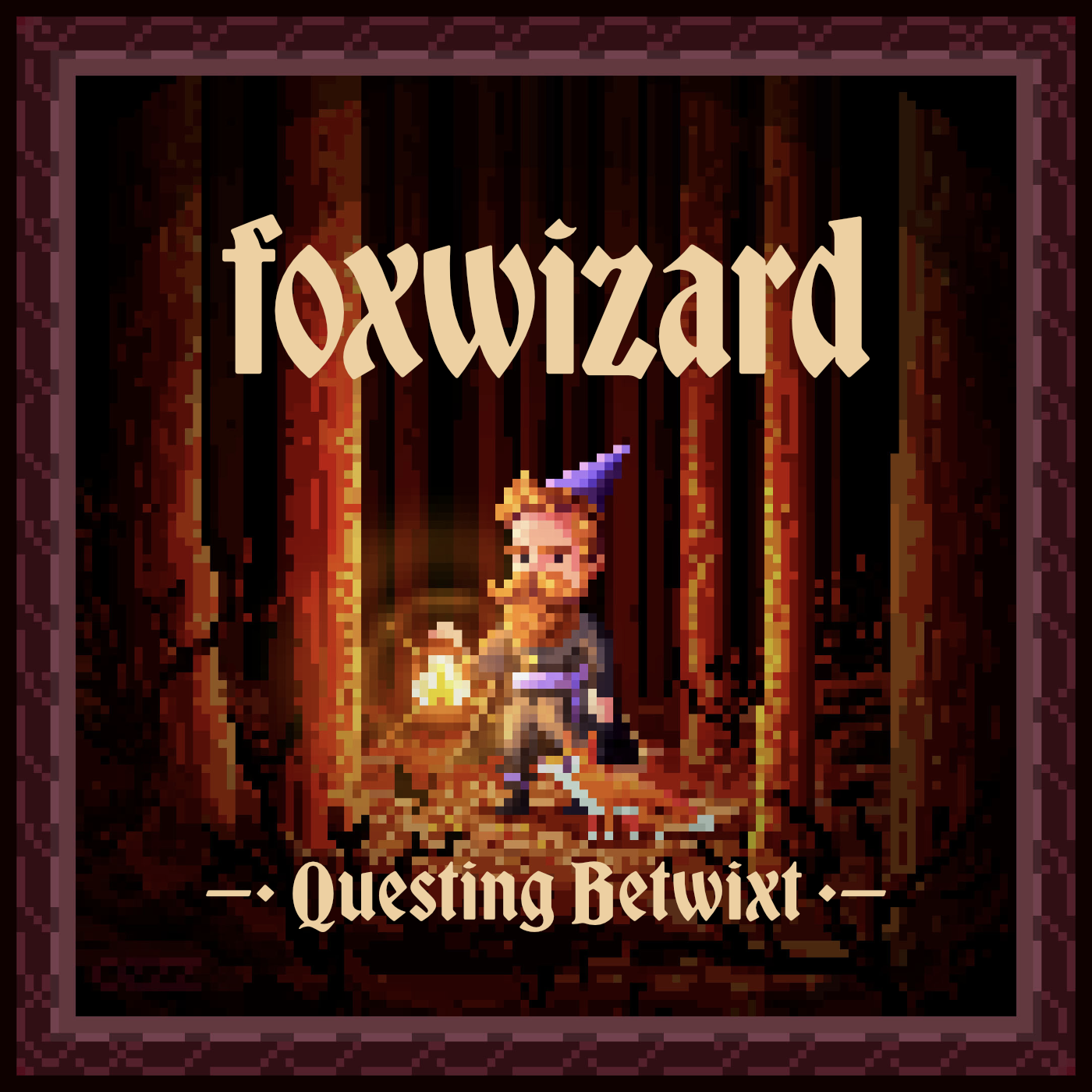
1. This museletter is an extravagance
To be extravagant is, in terms of root meanings, a quality in which you wander outside or beyond (especially ‘wandering from the usual course’). For this musing I have tried to do such; recording thee a long and indulgent muse-reflection, whilst sitting upon a rock in the midst of the river of mist and shadows (the Birrarung Marr), in the dusk-twilight of our recent equinox.
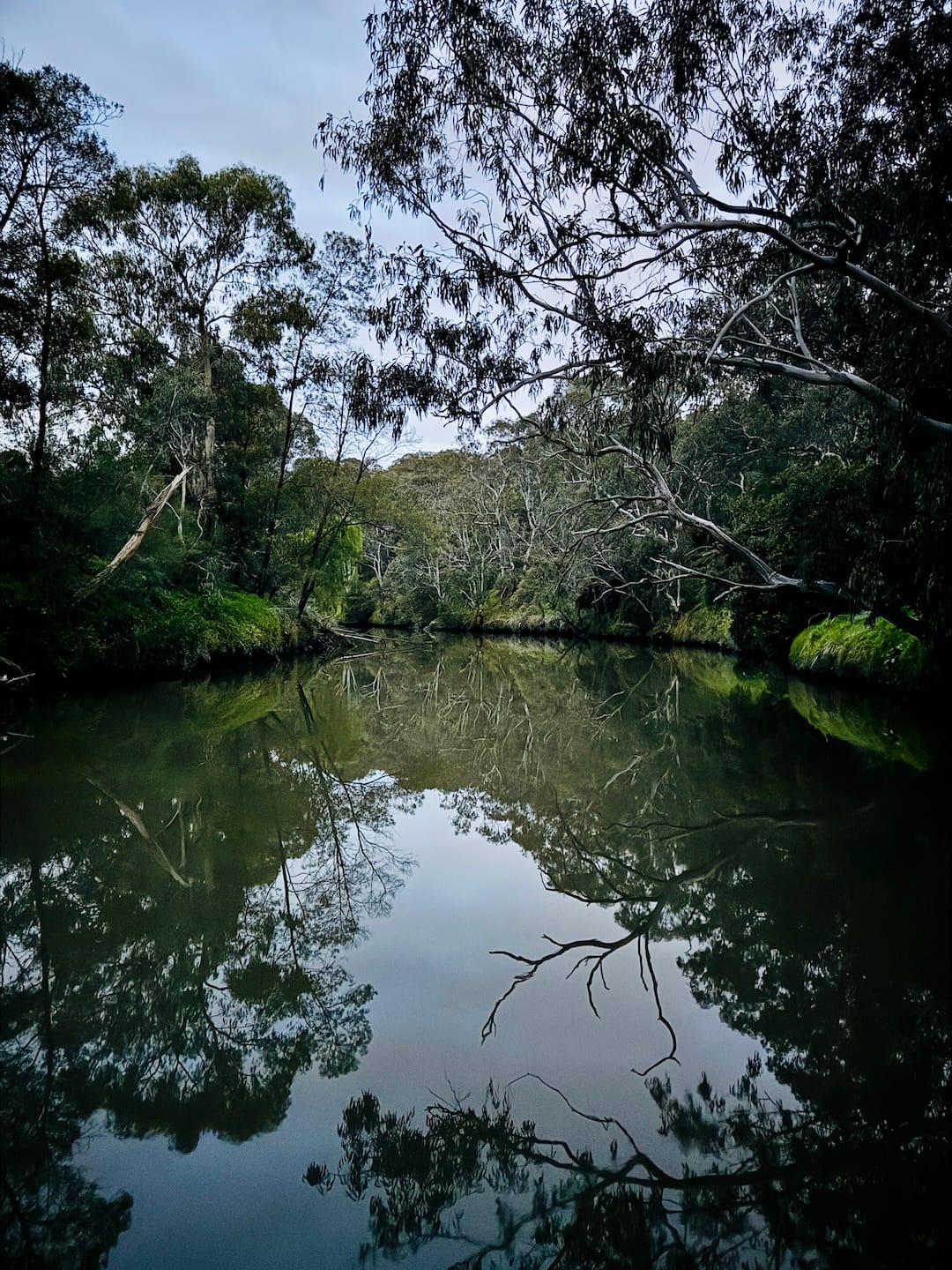
I think of this particular museletter (or perhaps all of my museletters) as a bit of an extravagance. At least, in the 15th-century sense of the term, in which extravagance might mean: ‘rambling, irrelevant; extraordinary, unusual’ and ‘wasteful, lavish, exceeding prudence in expenditure’. But also in a conventional sense: the hour-long audio note I recorded for you had many extravagant moments. Moments in which the birds—sea gulls, ducks, wattle birds, willie wagtails, butcher birds, currawongs, and a kookaburra—made their presence known.
There was even a point at which I thought I saw a bat. I later confirmed: it was a bat.
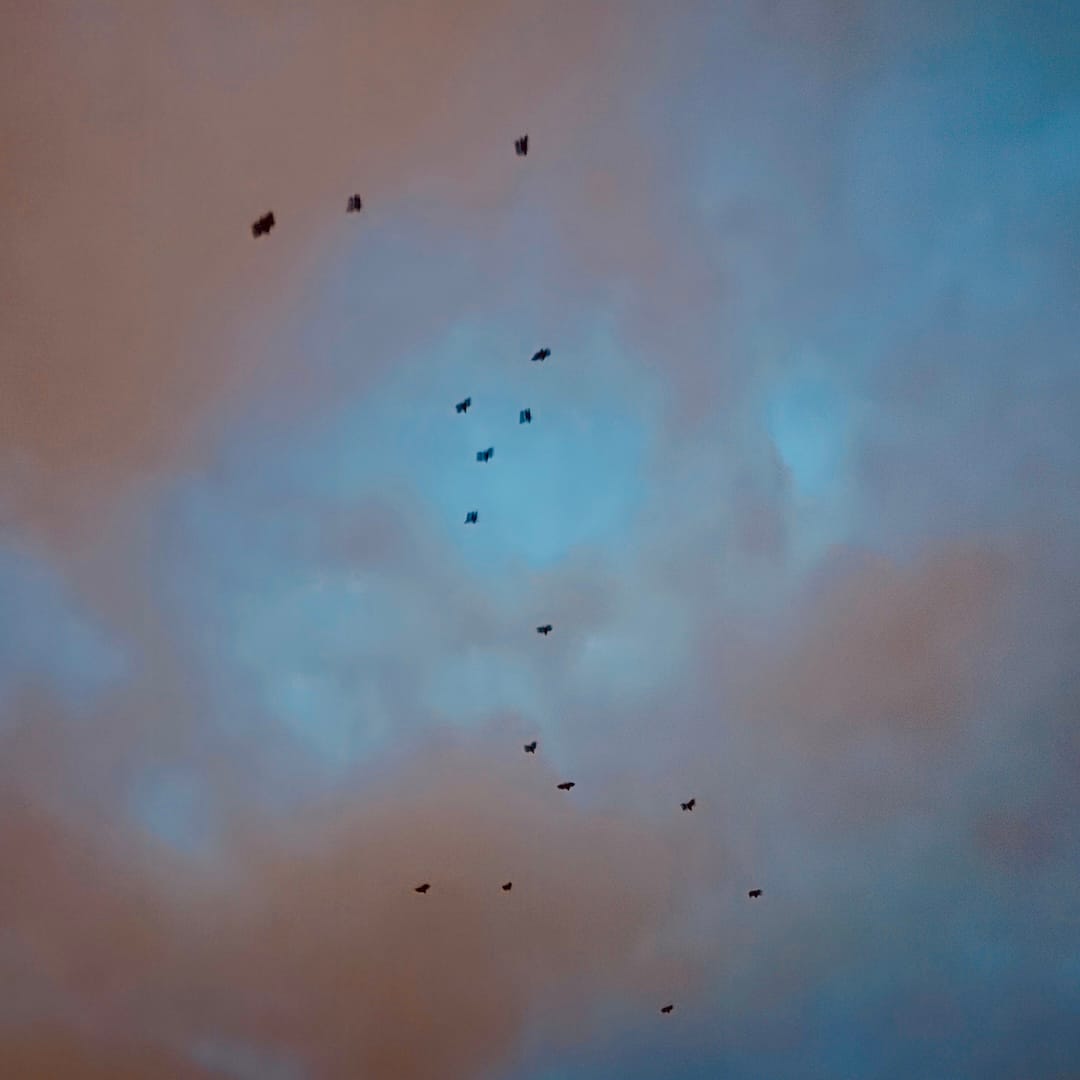
There’s something about spring time—and the spring equinox in particular—that has me enlivened to animacy. This is a relatively recent phenomenon. As I wrote in Spring last year:
Spring has—in theory, at least—arrived here in The Antipodean realms. This season has, for a long time, heralded an odd kind of melancholy within me. There’s something about the realisation that we are three-quarters of the way through a calendar year and yet still so many projects and important quests remain un-progressed. This, when contrasted with everyone else seemingly having Such A Great Time, seems to compound the effect.
But I am happy to report that This Time Is Different™—for me, at least—thanks to a ꧁profound healing꧂ retreat I recently experienced (along with a break from social media and computers, time in nature, good company, a campfire, the glimmering cosmos, the warmest meta-shaman I’ve ever did met, and ∾other things∾ besides). I shan’t directly write of the experience (so as to preserve some ⩫_mystique_⩫)—but I shall share with you the following stance I am bringing to this season, in the hopes it may enliven something in you.

This Time Is Still Different.™
Perhaps one day I’ll write on the ꧁profound healing꧂ retreat I experienced.
2. Or perhaps now?
I’ve had a range of folk ask me about this. I’m certainly not an ‘expert’—my magic is more fox-like and fey (as distinct from shamanic)*—but I do find myself emphasising set and setting. And ritual.
* Something I discussed with my friend Simon on the podcast a while back. I call myself a ‘wizard’—but that’s simply a close-enough word that has enough archetypal resonance to be useful.
Of course I would. It’s much the same as the event work I do. We want to cultivate the conditions for emergence—not simply bequeath pithy-packaged wisdom from stage and brand it TRANSFORMATION™.
Likewise, a ꧁profound healing꧂ retreat cannot be reduced to the precise number of micrograms of 4-phosphoryloxy-N,N-dimethyltryptamine imbibed. This is the classic Western reductive, extractive and coldly clinical approach that entirely misses the point. Everything that went into the week-long container of the ‘Sacred Wound Retreat’ I experienced—the journaling, the yoga, the poetry, the qigong, the clean eating and shared meals, the nature walks, the singing, the artwork, the relationality betwixt fellow participants (who have become new friends), the fire under the stars, the ocean swims, the quietude and solace, the immense grounding presence and genuine care embodied by the guides, the grandmotherly cat who would sit with me, the kookaburras, the all of it—made what could have simply been ‘a nice trip’ into a ꧁profound healing꧂ journey.
Suffice to say, thirteen months later, I still highly recommend it. And I still find myself saying “it’s one of the best things I’ve done in decades”. It’s what—after years spent ‘lost’ in the dark forest, wandering the underworld (important time, not wasted), with all the clever trappings I’d woven for myself fraying into dissolution—enabled me to finally allow myself to experience the grief and sorrow I had within me. Because it’s one thing to ‘intellectually process’ genocide, ecocide, the metacrisis, and all the accumulated sorrow and woe of a life that has known loss—it’s quite another to metabolise it.
“… what I know, as I'm sure you do too,” Gabrielle Feather recently shared, “is that the profound assault we feel when truly facing collapse, ecocide, and cultural breakdown is not something to be treated away. It is a threshold, a crack that runs through our civilisation and through our own hearts.”
I could wax mythopoetic about this with you for… quite a while. The rest of my life, really. Not of me-and-my-journey, but of the need for each of us to each find our way to our vocation and calling. It was not necessarily the intent of this reflective museletter—but here we are.
There is, I confess, an impish part of me that delights in swimming against the current that would see all writing homogenised into short form; all complexity reduced to soundbite.
The impeded stream is the one that sings, etcetera.
But where was I? Oh, yes. I must say: if you are wanting to experience a ꧁profound healing꧂ experience—you have to keep your wits about you. The Machine—aka M̶̛͇̝̘̲̑̐̍̋ơ̶̢̛̪̦̘̱̒̒̀̄͑̚l̸̩͉̱̝̦͋̿̄̕ơ̴̡͍̯̤̟̪̍̓́͛͋̂c̴̨̘̜̙̠͆̏̐̿͐͠h̸̭͔̥̰͕̥̼̥̑̌̏̅̔̚͘̚—is already commodifying the field. Just like with everything else, it has become an industry. An industry increasingly filtered through a Western lens.
In Psychedelics and the Soul, depth psychologist and author Simon Yugler provides apt priming.
“A new generation of psychedelic healers, therapists, educators, researchers, and business leaders is emerging. Laws are changing, prohibitions are loosening, and modern culture is beginning to molt its skin in favor of something that is increasingly strange and uncertain.
On many counts, this is cause for celebration. Yet amid the collective effervescence of the ‘psychedelic renaissance,’ what if something is getting lost? The word psychedelic, coined by British psychiatrist Humphry Osmond, is often said to mean ‘mind-manifesting.’ Yet if we follow the trail of language back to its roots, the Greek word psyche actually refers to the soul, while delos means to reveal or make manifest. Psychedelic, therefore, literally means ‘soul-revealing,’ a necessary distinction that sets our compass squarely in the direction of this inner domain.
The mind is easy for modern Western culture to compartmentalize into a neat category of understanding. The soul, not so much. The soul escapes quantification; the mind delights in it. The soul dissolves boundaries; the mind constructs them. The soul orients us toward the eternal; the mind toward the time-bound. For many people, the very mention of the soul is an unsettling proposition, for to acknowledge it means to acknowledge that life is more than a random conglomeration of particles floating through cold, infinite space. To acknowledge the soul is to acknowledge that in fact there is something out there, down there, in there, that escapes our understanding and control. To acknowledge the soul terrifies the ego.”
It sure does terrify the ego, and dissolve boundaries. Just a few years ago, I had severe allergies to the word ‘soul’; always ready to justify it from a rational lens. That’s changed, now.
Simon then goes on to aptly and appropriately acknowledge the Indigenous cultures that have, for so long, held the wisdom and the ways we (in modernity) are at risk of taking for granted. Like we do everything else.
“The fields of psychedelics and depth psychology are indebted to Indigenous cultures in unfathomable ways. The fact that these cultures managed to keep their ancestral stories and ceremonial knowledge alive in the face of genocide and colonization is itself a miracle. These traditions and their living stewards deserve our respect, gratitude, and reciproc-ity. In studying and relating with Indigenous peoples, modern Western people might find something reflected back to them that, once upon a time, we could have recognized as an intact culture.”
Simon also adds:
“Indigenous cultures are not a means to an end for the Western world to figure out its problems. Valuing Indigenous cultures simply for what they have to teach us, for what we have to gain from them, is yet another form of colonial extraction. This approach of siphoning Indigenous wisdom solely for the purposes of benefiting modern culture continues to marginalize these communities. Right relationship and informed, consensual reciprocity are two avenues that can help mitigate this subtle yet real dynamic.”
This is not a musing on the ꧁profound healing꧂ retreat I experienced. But I am appreciating how the leaks make themselves apparent.
3. Boundaries, witches, wilderness
The title of this post actually came to mind when I read an article from Dougal Hine the day after the attached equinox audionote I made you. It’s where I learned of the root meaning of ‘extravagance’. In this piece, Dougal offers great and appropriate homage to Ivan Illich, the Austrian philosopher whose polemic Deschooling Society (1971) I referenced back in episode 12. In a world that is seemingly all-too-ready to sacrifice children (our inner children, and actual children—of Gaza, Congo, and more besides) along with our very humanity for the sake of M̷̛͈͉͑́͒ơ̸̧̢̺̼̩̂͑̎ͅͅl̷̨̨̬̟̞̹͍̬̥̟̦̤̹̖̪̰͕̎̿̚͘ŏ̷̢̧̢̗̺̬͎̹͒̏͆̎͋͑͘͝͝c̴̥̭͇͕͛̃̈͗̎̆͂̽̓͐̓͝͝͠h̵͕͑̀̈́͆͆̓̌̍͑̅̈́͠ (aka The Machine), Illich’s philosophy reads as ever the more vital.
Here’s an excerpt from Dougal Hine’s essay, The Other Shore of the Nile.
“[…] Illich presented his contribution as an ‘extravagance’, a term he loved for its root meaning, ‘to wander outside’. In the works of Saint Augustine, he would tell a later audience, ‘the word extra-vagare [suggests] to take leisure; to look at how you live today, here, from the outside.’ This was the spirit in which Illich spoke. Of course, ‘to wander outside’ is also ‘to go beyond’, with a suggestion of transgression, and Illich was alive to this; yet he is a curious transgressor, one who has a reverence for boundaries. You might say that it was this reverence which compelled him to step outside and speak about ‘how you live today, here’.
This paradoxical relationship to boundaries is made vivid in the last in the litany of exotic words by which Illich chose to declare himself to his audience of Catholic philosophers: ‘I am,’ he says, ‘a Zaunreiter’, a hedge-straddler, ‘which is an old name for witch’.”
Okay so maybe I just included this excerpt because I have a liking to those who seem to resonate with the sacred sensibilities of Trickster, and of wise men who might call themselves ‘witch’. For such, thresholds and boundaries are an exquisite paradox; simultaneously marking division whilst also enabling passage.
Hermes—god of boundaries and crossroads (amongst other things)—naturally comes to mind when I evoke Trickster. But if we are to evoke Hermes, then we might also evoke Hecate—goddess of witchcraft and crossroads (amongst other things, too).
Where Hermes transgresses boundaries (revealing their constructedness); Hecate holds boundaries as spaces of liminality itself. This is from whence, I suspect, witches tend to operate.
Thus when I read that Illich declared himself a hedge-straddler (a witch), it reminded me of the witch Lee Morgan’s review of Wolf Milk—a book by the mythologist Martin Shaw (whomst I mention many a time in my museletters to you, and in the recent audionote). “Dr. Shaw uses the village and the wild to convey what in witchcraft terms might be described as crossing the hedge,” Lee writes. “His discussions on the process of going and returning would be very relevant to my readers and anyone interested in hedge crossing.”
Fox, btw, straddles a similar domain betwixt field and forest—the liminal ecotone between the domesticated and wild. This is why, perhaps, fox spirits and gods are so often seen as messenger and boundary crosser (amongst other things).
4. Try watching a live stream
In Wolf Milk, Martin Shaw reflects “on almost two decades leading vigils in the wilderness. Through myth, poetics and hard-won brooding he offers a way for modern people to enter an ancient ceremony. This startling book suggests a wingspan of both mystical experience and civic duty underpins the encounter.” I haven’t read it yet—but I have it on order.
A wilderness fast is something I feel drawn to experience.
There are many interpretations of what a wilderness fast is, exactly, but the consensus seems to be four days and four nights alone in the wilderness with nothing but water, a tarp, the wild, and a non-zero chance of death. Bill Plotkin, whom I also find myself evoking a lot these days, has written of this in a few books, including The Journey to Soul Initiation (a work that Kim and I have been deepening into this past year).
I am hesitant to call a wilderness fast a ‘Vision Quest’, as some might. At least, not overtly. As one with a penchant for questing, I’ve come to know that we need to be mindful of any ‘goal’ orientation. But a period of time, in the wilderness, away from the internet and all the distractions of modernity, to allow whatever might emerge to emerge, seems… overdue. For me at least.
Hence my attempt to foster a bit more ‘time in nature’. Microdosing wilderness somewhat safely via extended time at a sit spot by the river. And then corrupting it slightly by making it a recording for you.
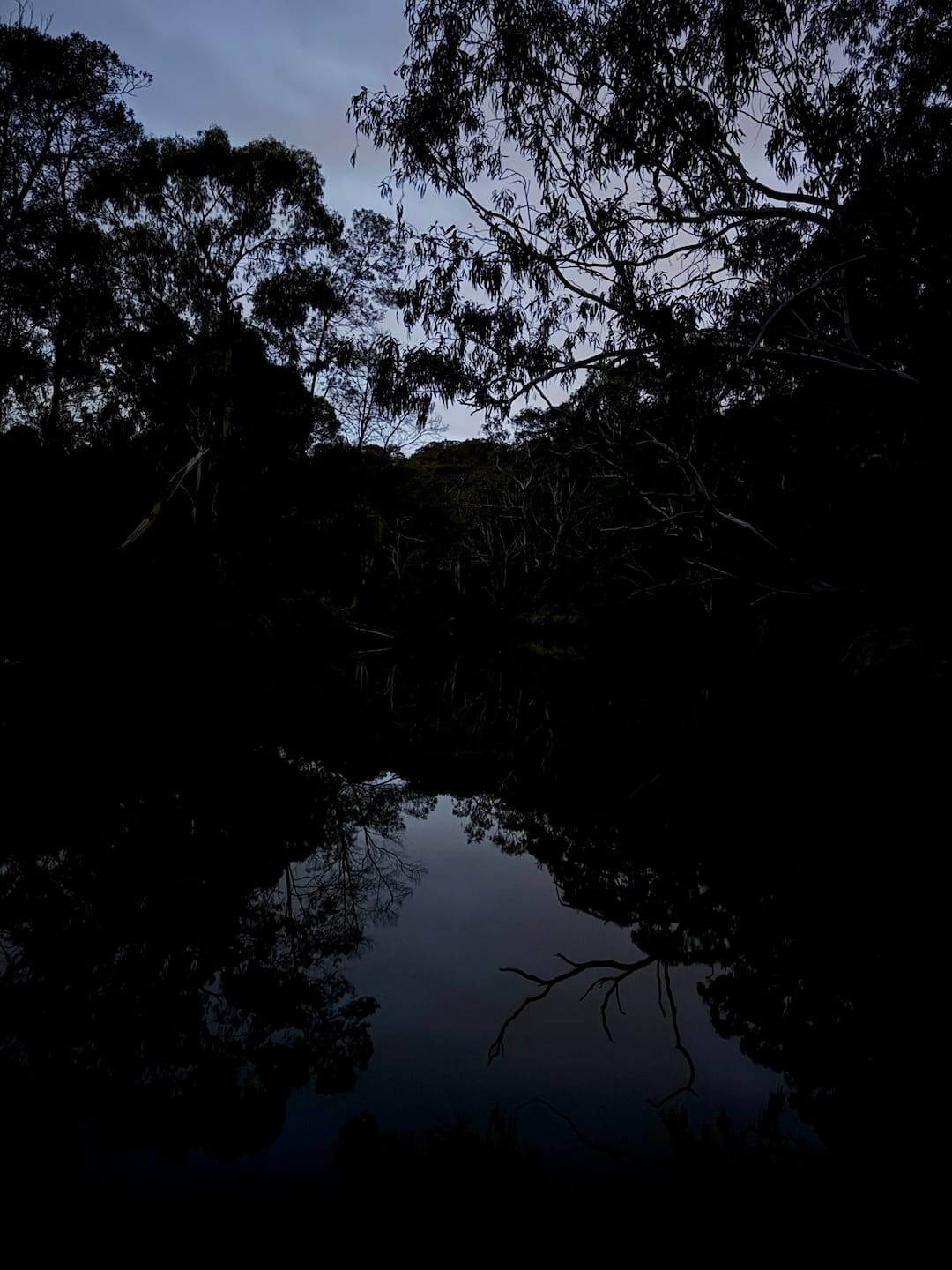
“Can I call you back? I’m watching a live stream” has become a bit of a meme recently (though it is many years old, now). But I can’t say ‘stream’ without evoking the last two lines of Our Real Work—one of my favourite poems by Wendell Berry. As you likely have heard me share before.
The mind that is not baffled is not employed.
The impeded stream is the one that sings.
I sure do my best to baffle (to enliven the mind)—but sometimes I suspect it is not enough.
Meanwhile, I—the foxwizard—have a task for you. If you read the next sentence you will be under a geas* (apologies, this is just the nature of things, and how the spell works—so if you are disinclined, do not read or even glance at the next sentence).
Find a place to sit—ideally near water, and at dawn or dusk (but anywhere outside will do)—and simply behold (with no phone, conversation, reading, journaling, or distraction) for at least twenty minutes (perhaps even an hour).
Pretty lightweight geas, tbh. Perhaps too easy to fulfil. But I wish you well.
* Thanks to my friend Vas Clementine who reminded me of this.
5. Mind thy thresholds
As you might recall, I started off mighty enthusiastic about artificial intelligence. I worked with clients exploring it back when How to Lead a Quest was written (and I even used an example pertaining to artificial intelligence and the legal system within the book). But, as readers will know, I have in the past few years found myself swimming tangentially to the current we conventionally call ‘progress’.
For what we conventionally call ‘progress’ seems—to me at least—nothing other than a rich delusion of progress. Something that may very well lead us to our demise. Meaningful progress, on the other hand, is harder to ‘define’. I have said in the past that meaningful progress is “that which brings us closer to future relevance”—but wtf does that mean? “A state in which whatever we are doing ‘makes sense’ given the context we find ourselves in,” I cockily answer. My past self had so many ready-answers. My current self gives him a pat on the head. Good boy.
All I have these days is ‘a sense’. A sense that has been with me for at least a decade. A sense that together we must quest to co-create a world more curious and kind (and a future less grim).
Part of this requires that we attend to boundaries. This means we must pay particular attention to thresholds, and to know when to transgress boundaries, and when to hold and affirm them. It also means we relate to boundaries as living things—animate and shapeshifting, too.
6. Perhaps you are ready to slip The Machine?
In Dougal Hine’s erudite essay The Other Shore of The Nile—Ivan Illich & the possibility of Exodus in a technogenic world, there is a passage that speaks to Illich’s distinction between tools and systems.
“There is a further sense in which Illich straddles a boundary, a point on which he elaborates in the Los Angeles talk and other writings of this period: he had been born into a world of tools, but had witnessed its transformation into a world of systems. A tool can be taken up and put down, according to the user’s own intentions, and the boundary between tool and user remains clear. A system envelops the user, in a previously unimaginable way, so that the boundary loses its clarity: the user becomes a component within the system, dependent on and formed by its capacities and needs.” (emphasis mine)
We have become enveloped in systems; systems that shape and distort our ‘defaults’. We then optimise ourselves to these defaults, sacrificing our lives in service to The Algorithm/M̸̡̨̡͕͉̲̝̱͎̘̮̏͛̉̏͊̄̅̋̑̚͝ǫ̴͍̟̼̜̝͙̤̲̘͖̙̓͆͗̒͑̎l̴̨̥̪̝͉̙̝̙̞͎̟͍͔̙̎̆̾ó̶̧̇̈́̍͗̈́͗͗͌̔c̴̺͍͍̺̒͑̆̈̿͂̔͊̃͠h̵̡̦̖̞̠̗̆̾̿͂̔͒̇̌̄͜/The Machine. It’s time—past time, yet still time—for us to restore some boundaries. Time to sit with the goddess of limit.
“I worry about The Curse of Efficiency” I said, in an embarrassingly broody video, ~10 years ago. At the time I saw it as a mere unquestioned enslavement to the cult of productivity. A narrowed focus and metric obsession, drunk on the delusion of progress and fabricated notions of ‘success’. I’d thought that if folks could simply recognise true value, meaningful progress, and deep relevance, that’d be enough. But it wasn’t, and we are all still so deeply hoodwinked; asleep and under a terrible spell.
Paul Kingsnorth, a friend of Dougal Hine and co-collaborator behind The Dark Mountain Project, has a new book on the matter. It’s called Against The Machine—on the unmaking of humanity. The cover design is perfection.

Paul is a writer I deeply appreciate and respect—even if he summons forth notions I am not always entirely comfortable with. He is, like the many of us awakened to our plight, gesturing in a direction that broadly aligns with my sense that which might bring us closer to ‘a world more curious and kind (and a future less grim)’. His work of ‘fiction’ from five years ago—The Basilisk—is still deeply resonant to me, and offers an appropriately mythic way of relating to Entities That May Not Have Our Best Interests At Heart.
Related: “If an unaligned entity invests billions of dollars into an application which you use, where they benefit from wasting your time, and you haven’t at least done a cost-benefit analysis so that your usage minimizes your costs and maximizes your benefits—You are probably getting fucked over.” from The Pond.
Whilst I am waiting for Against The Machine to arrive at one of our favourite independent bookstores (The Paperback Bookshop on Bourke St), I couldn’t help but read a wondrously caring and insightfully generative ‘critique’ of the book by Adam Smith (a professor of political philosophy). Adam concludes his essay with the following passage:
“The question is whether there’s room for a little more ambivalence. It might even be that ambivalence—or the trickster’s irony—is the proper form of resistance to a monster that thrives on opposition.”
The book I have been writing for you, on an off, in ways that have both destroyed and enlivened me, is called ‘Mythic Mode’. It’s a spellbook, written by a foxwizard, that will help you slip The Machine, find yourself, and work thy magic.
It’s taking so long because I am having to live the lessons the book seeks to teach. I’ve been courting my muse, and she’s taking me through mud and tangled thicket.
But—much better this than her absence. I remember writing a museletter titled ‘foxwizard hermit seeks muse’ in 2021, after realising I hadn’t written a museletter in over 10 months. It was horrid; I was lost in a self-indulgent pitiful hole.* I think that was my last post on Substack before I set fire to much of my past writing, and moved to Ghost.
* But luckily the source is bright and endless. She resuscitates the hopeless—without her we are lifeless satellites drifting. Yes I’m quoting TOOL again..
Recently I have restored some boundaries between social media and myself. It’s ongoing work to limit The Machine, and to cultivate that sublime ambivalence that has worked so well for me in the past. And—it has been so good for me. I can hear my own voice once more. I highly recommend it.
Kening Zhu is an inspiration. Her podcast episode on The Joy of Missing Out on Platforms is heartening affirmation for those of us who eschew both the mainstream social media platforms and the concept of complete disappearance. I’ve also been enjoying Time and Other Thieves by Sarah B. In particular this episode where she talks of the Lateralus by TOOL. Both Kening and Sarah are quietly doing their own thing—off social media. And there’s a quality, integrity and depth that has me hooked.
Anyhoo, as I conclude this extravagant museletter—on healing, boundaries, magic, the machine, Trickster, and more—allow me to quote from Italian philosopher Federico Campagna’s 2018 book Technic and Magic.
“Every sacred space is surrounded by a limit—as the guardians or the labyrinth surrounding a treasure, in several mythological traditions—and not everything will be able to pass this threshold.”
How are you preserving the sacred?
How are you keeping The Machine at bay?
7. Snake Talk & The Last Rekindling
And now a few quick reflective updates. My friend Paul Kearney and the team at Kearney Group hosted what may be ‘The Last Rekindling’.
Meanwhile, here’s a picture of me with Megan Kelleher and Tyson Yunkaporta. It was an absolute joy to celebrate the launch of Snake Talk, and to connect with the kindred spirits these events attract.
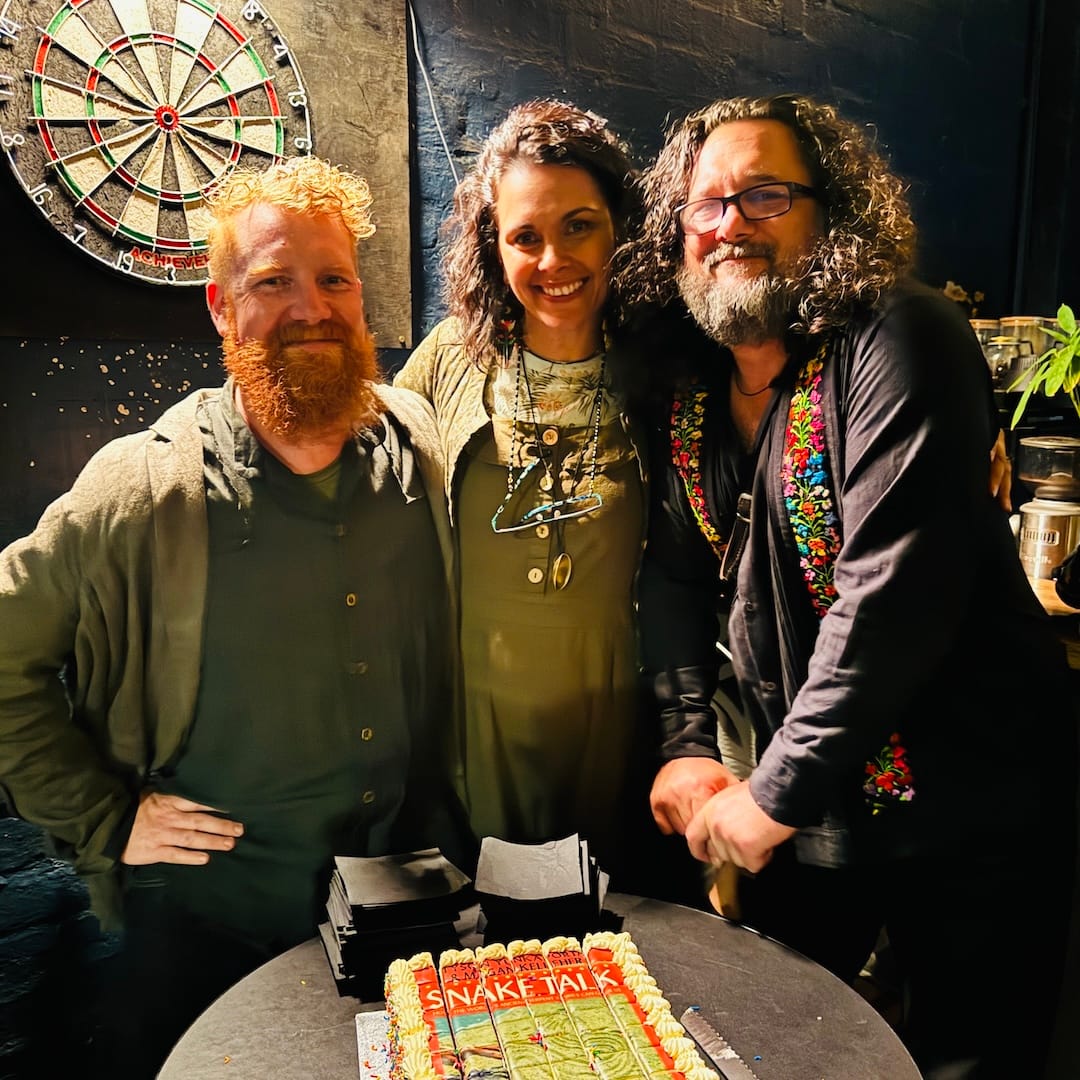
The charm of these events is in the conviviality that happens when a group of people gather for a talk—and then walk together to a local brewery to share a meal and a drink together. The event started at 530pm and many of us were still there at 11pm! They had to shoo us out.
I’m quite sure that the essence of The Rekindling will emerge again someday. There’s just something too timely and vital about it. So: stay tuned, friends.
PS: International and interstate readers—Garland Magazine are hosting a very special online event to celebrate the launch of Snake Talk. Here’s an article published in Garland Magazine, well worth reading—Snake Talk: A yarn with story-makers across the globe.
8. A wizardly river walk
My dear friend Michael Bungay Stanier—author of The Coaching Habit, The Advice Trap, and other wondrous books—was in Australia once more. I met MBS nearly a decade ago when I was speaking at a very large HR event in Toronto. We had dinner and the friendship has blossomed ever since. We’ve done a standard event, an event at a whisky distillery, and a couple of podcast series (which we didn’t publish—but MBS’s latest podcast, Change Signal, has a delightful honouring of one of my previous foxwizard museabouts). This time we thought: let’s do something different.
And so the ꧁ wizardly river walk ꧂ was conjured. A dinner, a 20km walk in the forest by the river, WIND AND CHAOS, another dinner, tiramisu. I’m going to preserve the mystique of this and simply share a sample of some nice words shared by fellow adventurer-participants.
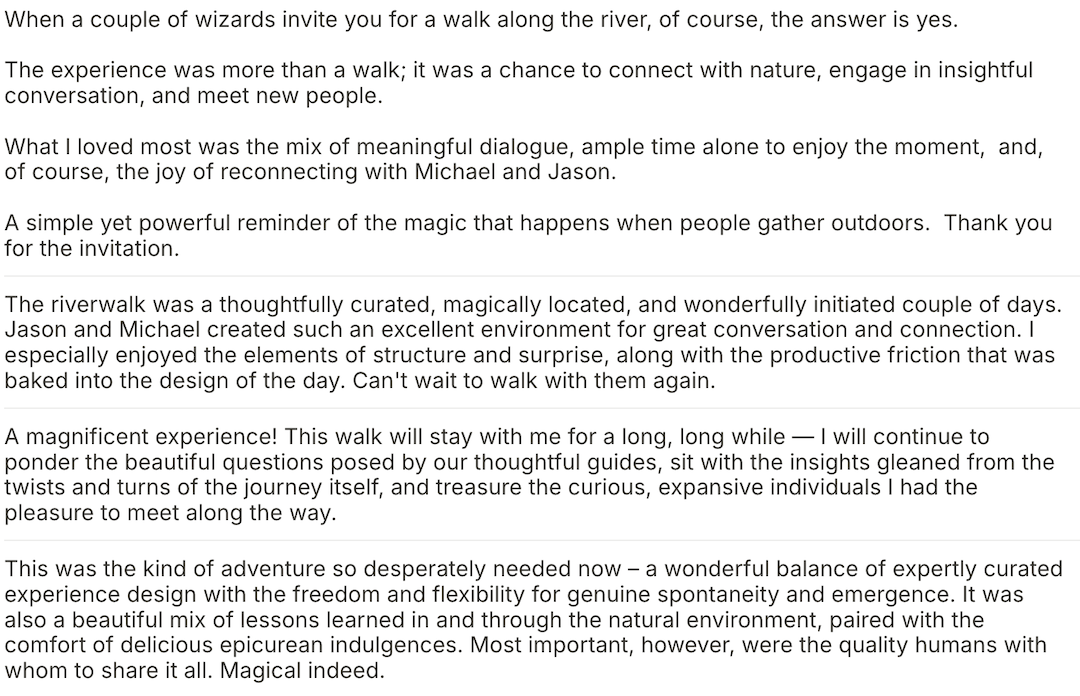
Be sure to be subscribed if you’d like to hear of future events.
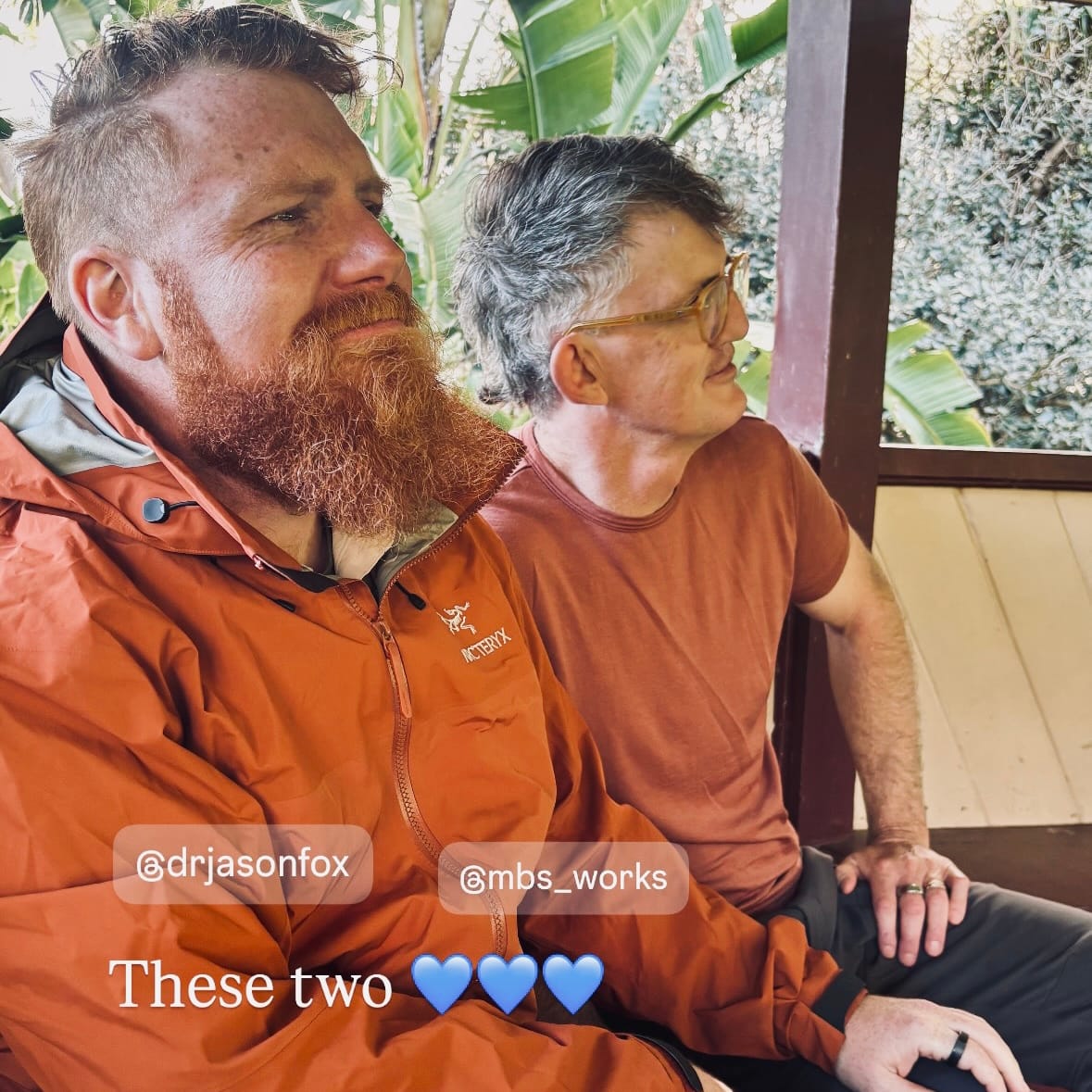
9. Kindred Spirits
Gosh September was an eventful month. We shared episode 6 of Kindred Spirits (which you can also watch and say nice things about on substack). We called this episode “You Do You, 100%” and I can’t even begin to share the sublime snippets laced throughout.
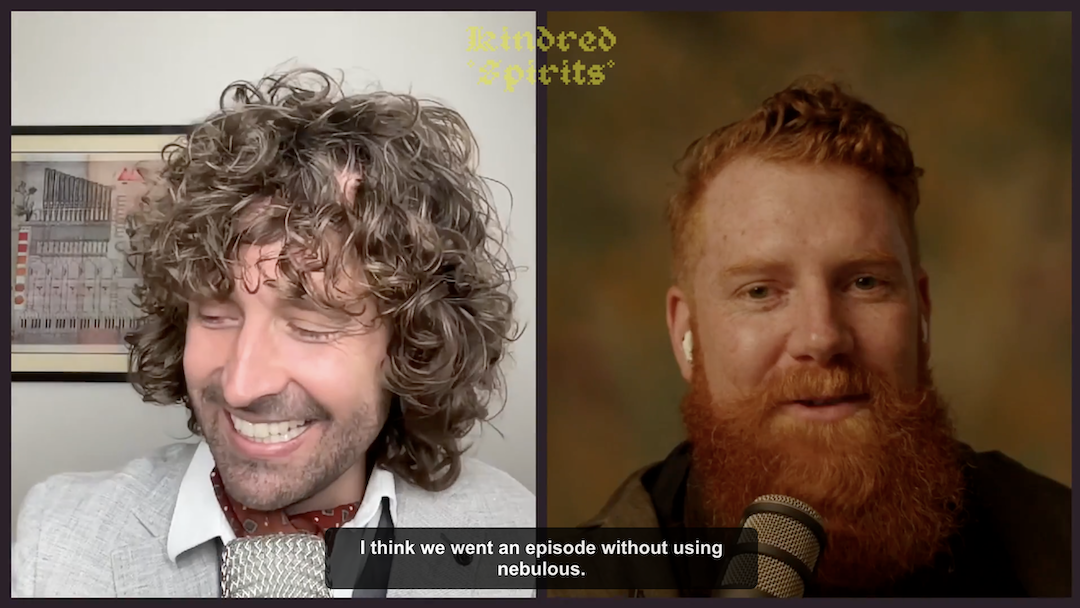
I’m also two episodes behind! I have two episodes of Kindred Spirits to share with you this week. It’s getting weirder and more wily, and I love it. My co-host John Anthony has become such an inspiring friend. I’ll do a proper love post next time, though, as I am generally trying to keep these museletters to ‘under 5k words’, ha.
10. Warmly secure
Whilst Kindred Spirits emerged as a ‘foxwizard popup podcast’—and will now become it’s own thing—I still want to have conversations with wondrous folk on the ‘regular’ foxwizard podcast. It was always ostensibly for those of us ‘questing, amidst the metacrisis, in a time betwixt worlds’. Except this podcast began when I was still wandering the dark forest (before the ꧁profound healing꧂ retreat). I hadn’t quite experienced the ‘post-tragic’ stance, yet. Not properly.
But here we are now. Things are—you may have noticed—grim as ever. The future? Bleak. It’s tragic, and yet… there remains the haunting call of Eros and the wisp of a glimmer of a thread that may well lead us to co-create a world more curious and kind (and a future less grim). It’s a thread worth following.
And so I seek to court the perspectives from fellow kindred spirits who quest amidst the liminal and emergent. Folks who, loosely, have a combination of at least a few of the following qualities:
- a metamodern ‘both/and’ orientation
- a metasystemic lens
- metarational capabilities
- complexity savvy
- mythopoetic sensibilities
- a deep sense of the metacrisis
- an embrace of the infinite game
- a transperspectival flex
- a bias towards relationality and wholeness
- a sense of humour
- a kind of wisdom
- a kind of wit
- the hint of wiles
- a bright mind
- a warm heart
- and so on
This list is non-exhaustive, but it gives a good gist. I expand upon what I mean for each item in the show notes for episode 15 of the foxwizard podcast, wherein I talk with the experienced public sector security practitioner Greg Dack.
A security practitioner? Yes, indeed! Greg has been a long-time subscriber and friend. He brings an inherently warm and pragmatic, complexity-informed approach to creating the conditions in which communities can experience a generative kind of security.
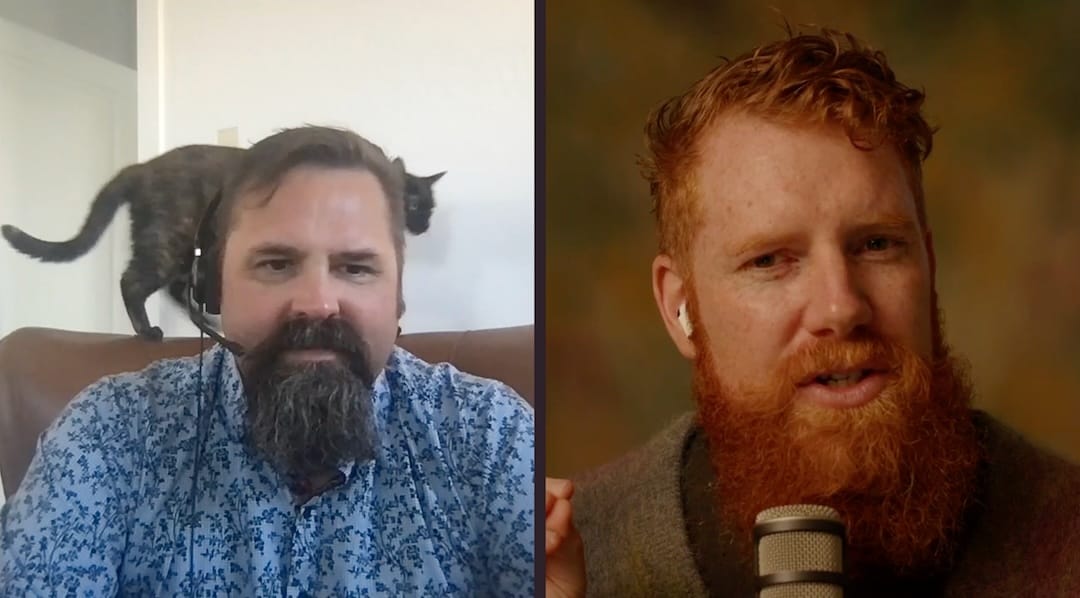
To quote from my own show notes:
Greg’s approach suggests that our most enduring sense of security emerges not from fortress-building, but from cultivating the conditions that enable communities to be and become inherently more caring and resilient. There’s an echo of James P. Carse’s analogy of the machine and the garden, here.
There’s also that damned 𝌉 ‘Machine’ 𝌉 again, eh? Did you see it? James P. Carse knows what’s what.
But hey—there’s a garden, too.
And kindred spirits, feeding the leaks.
11. I should probably mention Dr. Fox stuff
Dr. Fox—my daylight persona, my ‘performance artistry’ that takes the form of an award winning motivational speaker, bestselling author, and highly regarded leadership advisor—is doing great.
This is my trojan-horse work; smuggling wit, wisdom and wiles into the heart of The Machine so that we might enliven cultures from within.
There are two main modes I work in as Dr. Fox:
- Keynote presentations and fireside provocations, naturally. Events can be catalytic, if we attuned the magic. I do it well.
- Leadership and strategy immersions. Like a masterclass, except much more interactive and attuned to your current context. Here we go deep.
I also work with fellow kindred spirits and infinite players as a wizardly ‘advisor-accomplice’. Here I help you be more effective and subversive, look great, develop your own mythos, and cast better spells.
My worry is that there are fewer folks who know just how much better things can be. Like how kids these days are habituated to diminished biodiversity—and don’t know just how flourishing even a back yard can be—so too leaders within organisations have become habituated to The Machine, optimising their way to oblivion. Still, there are some of us who yet know: a much better way is possible. Even amidst the metacrisis, in this time betwixt worlds.
Erm, just to be overt: I am currently taking bookings for first half of 2026. There’s also some patchy availability between now and mid-December. Reach out to kim@drjasonfox.com if you’d like to explore working together.
12. The School of Fox Wizardry
I’ll be teaching my ‘secrets’ and magics to a small group of rogue wizards in 2026. Here’s a tease.
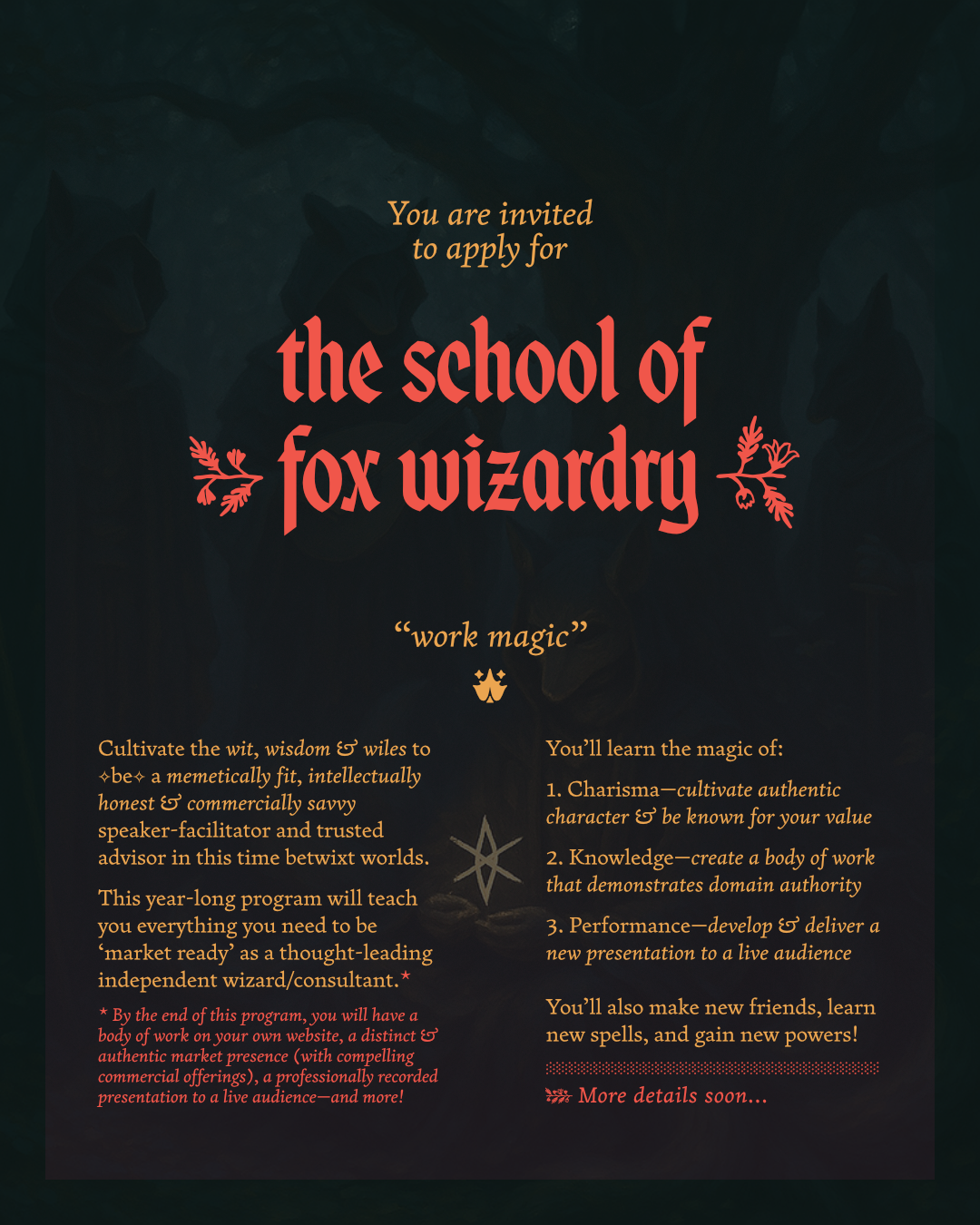
More details in the next museletter. xoxo
Thank you for reading all the way through. A rare gift and honour in these distracting and diminished times.
Much warmth to you,
Jason


Member discussion